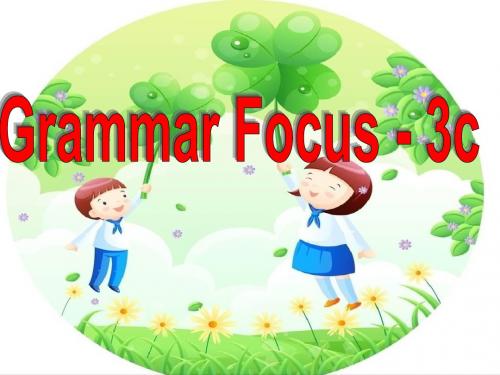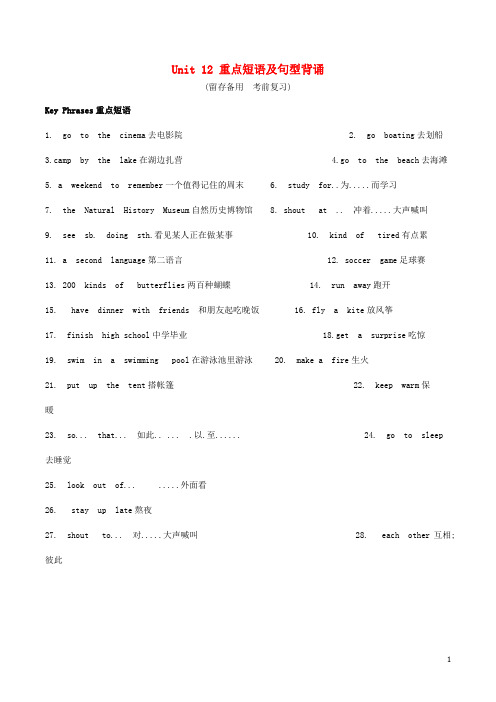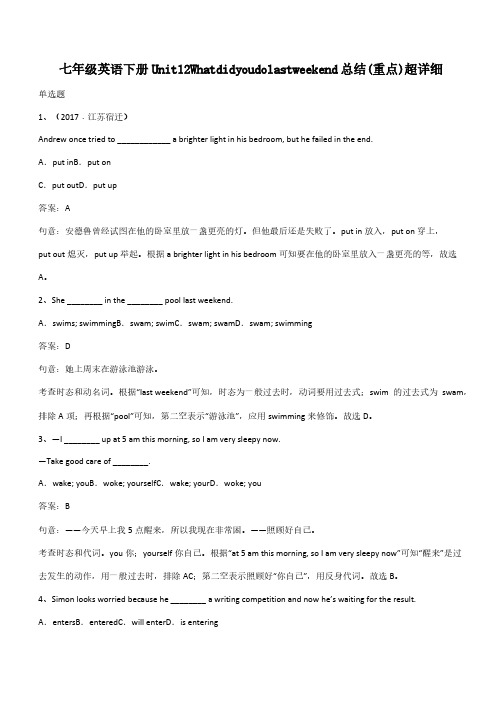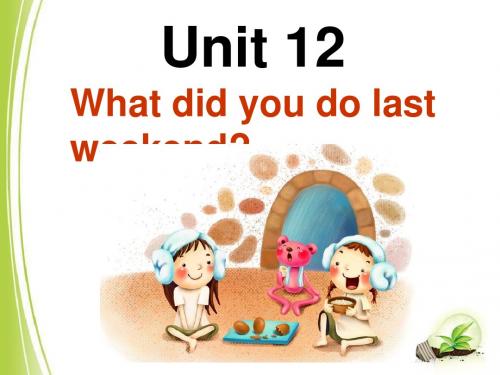七年级英语下册 Unit 12 What did you do last weekend第三课时 Section B(1a-1e)教案(新版)人教新目标
七年级英语下册unit12_What_did_you_do_last_weekend_Section_A_2

7. 她去了农场。
____________________________ She went to the farm.
8. 她和谁一起去的?
____________________________ Who did she go with?
9. 她和她的同学们一起去的。 She went with her classmates. ____________________________
1. A: ______ What did you do last weekend? B: I played badminton on Saturday. A: Sounds fun! _____ Who did you play with? B: I played with my father. He’s really good!
阅读Grammar Focus部分,完成
下列句子。 1. 上个周末你做什么了? What did you do last weekend? ___________________________ 2. 我做了我的家庭作业。 I did my homework. __________________
_____ Why _____ were you late yesterday?
2. 特殊疑问词 + did + 动词原形 + 主语 +其 他? 昨天他做了什么事情? _____ What ____ did he do yesterday? 上个周末她参观了什么地方? ______ Where ____ did she _____ visit last weekend? 你和谁一起去的动物园? ____ Who ____ did you go to the zoo _____? with 他们什么时候到达北京的? _____ When ____ did they arrive in Beijing?
七年级下册英语12单元单词

七年级下册英语12单元单词Unit 12 What did you do last weekend?一、重点单词。
1. camp [kæmp]- v. 扎营;搭帐篷。
- n. 露营;营地。
2. lake [leɪk] n. 湖;湖泊。
3. beach [biːtʃ] n. 海滩;沙滩。
4. badminton [ˈbædmɪntən] n. 羽毛球运动。
5. sheep [ʃiːp] n. 羊;绵羊(单复数同形)6. as [æz] prep. & adv. 作为;当作。
7. natural [ˈnætʃrəl] adj. 自然的。
8. butterfly [ˈbʌtəflaɪ] n. 蝴蝶。
9. visitor [ˈvɪzɪtə(r)] n. 游客;访问者。
10. tired [ˈtaɪəd] adj. 疲倦的;疲劳的。
11. stay [steɪ] v. 停留;待。
12. stay up late 深夜不睡;熬夜。
13. away [əˈweɪ] adv. 离开;远离。
14. run away 跑开。
15. mouse [maʊs] n. 老鼠;耗子(复数mice [maɪs])16. baby [ˈbeɪbi] adj. 幼小的。
- n. 婴儿。
17. shout [ʃaʊt] v. 呼叫;喊叫。
18. shout at…冲……大声叫嚷。
19. woof [wʊf] interj. (狗叫声)汪汪。
20. language [ˈlæŋɡwɪdʒ] n. 语言。
21. fly [flaɪ]- v. 飞。
- n. 苍蝇。
22. kite [kaɪt] n. 风筝。
23. fly a kite 放风筝。
24. high [haɪ] adj. & adv. 高的(地)25. high school 中学。
26. ago [əˈɡəʊ] adv. 以前。
七年级英语下册Unit12Whatdidyoudolastweekend重点单词及句型背诵默写

Unit 12 重点短语及句型背诵(留存备用考前复习)Key Phrases重点短语1. go to the cinema去电影院2. go boating去划船3.camp by the lake在湖边扎营4.go to the beach去海滩5. a weekend to remember一个值得记住的周末6. study for..为.....而学习7. the Natural History Museum自然历史博物馆 8. shout at .. 冲着.....大声喊叫9. see sb. doing sth.看见某人正在做某事 10. kind of tired有点累11. a second language第二语言12. soccer game足球赛13. 200 kinds of butterflies两百种蝴蝶 14. run away跑开15. have dinner with friends 和朋友起吃晚饭 16. fly a kite放风筝17. finish high school中学毕业 18.get a surprise吃惊19. swim in a swimming pool在游泳池里游泳 20. make a fire生火21. put up the tent搭帐篷 22. keep warm保暖23. so... that... 如此.. ... .以.至...... 24. go to sleep去睡觉25. look out of... .....外面看26. stay up late熬夜27. shout to... 对.....大声喊叫 28. each other互相;彼此29. play badminton打羽毛球 30. wake... up把... ... 弄醒31. up and down上上下下;起伏 32. go camping野营Key Sentences 重点句型1. What did you do last weekend? 你上周末做了什么?2. How was your weekend? 你周末过得怎样?3.I worked as a guide at the Natural History Museum. 我在自然历史博物馆当过导游。
Unit12Whatdidyoudolastweekend知识点人教版七年级英语下册

Unit12 What did you do last weekend?句子词汇精讲【重点短语】1. last weekend 上周末2. go to the cinema 看电影3. go boating 去划船4. camp by the lake 在湖边露营5. go to the beach 去海滩6. study for the English test 为了英语考试学习7. feed some cows 喂一些奶牛8. work as a guide 做导游工作9. over 200 kinds ofbutterflies 超过200多种蝴蝶10. living habits 生活习惯11. be kind of tired 有点儿累12. stay up 熬夜13.as a special gift 作为一个特殊的礼物14. put up the tents 搭建帐篷15. make a fire 生火16. keep sb. warm 使某人保持温暖17.so...that... 如此…以至于…18. get a surprise 吃惊19. see sb. doing sth. 看见某人正在做某事20. jump up and down 上蹦下跳21. climb onto one’s back 爬到某人背上22. shout at/shout to 大声喊叫23. wake …up 把...弄醒24. a useful lesson 有用的一课1.by the lakeby介词, 意为“在……旁边”,表示位置,相当于beside。
拓展:by作介词的其他常见用法:(1)表示移动方向,意为“经过”。
例如:My mother goes by the building every day. 我妈妈每天从这栋楼旁边经过。
(2)表示方式及手段,意为“用,靠,通过”。
He makes a living by fishing. 他以捕鱼为生。
七年级英语下册Unit12Whatdidyoudolastweekend总结(重点)超详细(带答案)

七年级英语下册Unit12Whatdidyoudolastweekend总结(重点)超详细单选题1、(2017﹒江苏宿迁)Andrew once tried to ____________ a brighter light in his bedroom, but he failed in the end.A.put inB.put onC.put outD.put up答案:A句意:安德鲁曾经试图在他的卧室里放一盏更亮的灯。
但他最后还是失败了。
put in放入,put on穿上,put out熄灭,put up举起。
根据a brighter light in his bedroom可知要在他的卧室里放入一盏更亮的等,故选A。
2、She ________ in the ________ pool last weekend.A.swims; swimmingB.swam; swimC.swam; swamD.swam; swimming答案:D句意:她上周末在游泳池游泳。
考查时态和动名词。
根据“last weekend”可知,时态为一般过去时,动词要用过去式;swim的过去式为swam,排除A项;再根据“pool”可知,第二空表示“游泳池”,应用swimming来修饰。
故选D。
3、—I ________ up at 5 am this morning, so I am very sleepy now.—Take good care of ________.A.wake; youB.woke; yourselfC.wake; yourD.woke; you答案:B句意:——今天早上我5点醒来,所以我现在非常困。
——照顾好自己。
考查时态和代词。
you你;yourself你自己。
根据“at 5 am this morning, so I am very sleepy now”可知“醒来”是过去发生的动作,用一般过去时,排除AC;第二空表示照顾好“你自己”,用反身代词。
七年级英语下册unit12_What_did_you_do_last_weekend

1. I worked as a guide at the Natural History Museum. 我在自然历史博物馆里做导游的工作。 “work as + 职业” 意为“做某工作”。 例如: Eric works as a music teacher in the club. 埃里克在那家俱乐部里做音乐老师的工作。 2.How interesting! 多么有趣啊! 这是一个感叹句,句子结构为: How + 形容词或副词 + (主语 + 谓语)! 例如:How interesting the book is! 那本书太有趣了! 3. stay up 意为“熬夜;深夜不眠” 。 例如: Don’t stay up late. It’s bad for your health. 不要熬夜,这对你的健康不好。
Who ____ did you go to the zoo _____? with 3.____ 你和谁一起去的动物园?
When ____ did they arrive in Beijing?他们什么时候到达北京的? 4._____
对下列句子中的划线部分提问。
1. I got up at nine yesterday morning. ______ ___ you get up yesterday morning? When did 2. We did our homework last night. _____ What ____ did you ___ do last night? 3. They were in the supermarket last Sunday. Where _____ were they last Sunday? _______ 4.My last weekend was kind of boring. How _____ was your last weekend? _____ 5.Linda took a walk with her parents after dinner. _____ Who ____ did Linda take a walk with after dinner?
人教版新目标七年级下学期Unit-12--what-did-you-do-last-weekend--知识点

Unit 12 what did you do last weekend?Section A 知识讲解一. last(1)last形容词“最后的,最末的”或者“紧接前面的,刚过去的”。
Today is the last day in the year.最后一天。
I didn’t sleep well last night. 昨晚(2)last副词,“最后地”,I’m the last one.最后一个。
(3)last 动词,“持续,继续,维持”等,The hot weather lasted a week.持续了一周。
二. camp(1)camp 动词,“扎营,搭帐篷”。
We go camping every summer.We walked all day and camped by a river at night.(2)camp 名词,“露营地,度假营”。
Let’s go back to the camp, it’s getting dark. 让我们回营地吧,天黑下来了。
根据汉语提示填空。
(1)When did you join the ______ ______ (夏令营)?(2)I like ______ ______ (去宿营)in the open air.3)We______(宿营)in the forest last night. (4)Let’s go back to the ______(营地)三. sheepsheep 可数名词,“绵羊”,复数还是sheep;goat指山羊。
How many sheep are there on your farm? 你们农场里有多少只羊?拓展:常见的单复数同形的名词还有:deer (鹿),fish (鱼),Chinese (中国人),Japanese(日本人)等。
四. byby介词, “在……旁边”,相当于beside。
Our teacher is sitting by the window.by与交通工具名词连用时,名词前不用冠词,意为“乘、坐、用”等。
人教版新目标英语七年级下册《Unit12Whatdidyoudolastweekend》优质说课稿3

人教版新目标英语七年级下册《Unit 12 What did you do last weekend》优质说课稿3一. 教材分析人教版新目标英语七年级下册《Unit 12 What did you do last weekend》是围绕学生日常生活和休闲活动展开的一篇文章。
通过描述学生们在上个周末所做的事情,引导学生运用一般过去时进行交流。
本节课的主要内容包括一般过去时的构成和用法,以及如何用一般过去时询问和描述过去的事件。
文章中涉及到许多与日常生活相关的词汇,如play basketball, read a book, watch a movie等,有利于激发学生的学习兴趣和参与度。
二. 学情分析七年级的学生已经具备了一定的英语基础,能够听懂并运用一般现在时进行交流。
但是,对于一般过去时的构成和用法还比较陌生,需要通过本节课的学习来掌握。
此外,学生们的思维方式和学习习惯各有不同,因此在教学过程中需要关注每个学生的需求,引导他们积极主动地参与课堂活动。
三. 说教学目标1.知识目标:学生能够掌握一般过去时的构成和用法,学会用一般过去时询问和描述过去的事件。
2.能力目标:学生能够在实际情境中运用一般过去时进行交流,提高英语表达能力。
3.情感目标:激发学生对英语学习的兴趣,培养他们积极向上的学习态度。
四. 说教学重难点1.教学重点:一般过去时的构成和用法,以及如何用一般过去时询问和描述过去的事件。
2.教学难点:一般过去时的构成,即在过去的时间状语(如lastweekend, yesterday等)下,动词要变成过去式。
五. 说教学方法与手段1.教学方法:采用任务型教学法,情境教学法和交际教学法,引导学生通过完成任务,参与情境活动和交际互动来学习英语。
2.教学手段:利用多媒体课件、图片、卡片等辅助教学,激发学生的学习兴趣和参与度。
六. 说教学过程1.导入:通过提问学生“What did you do yesterday?”来引发学生对过去事件的思考,引出本节课的主题。
- 1、下载文档前请自行甄别文档内容的完整性,平台不提供额外的编辑、内容补充、找答案等附加服务。
- 2、"仅部分预览"的文档,不可在线预览部分如存在完整性等问题,可反馈申请退款(可完整预览的文档不适用该条件!)。
- 3、如文档侵犯您的权益,请联系客服反馈,我们会尽快为您处理(人工客服工作时间:9:00-18:30)。
第三课时Section B(1a-1e)
Target Navigation 【目标导航】
Key words and phrases:
fly,kite,fly a kite
Key sentences:
—Did you do anything interesting last weekend?
—Not really,but I visited my sister.
Skills:进一步学习和谈论过去事件。
Emotion:交流回忆以前做过的事情,增进同学间的相互了解。
The guidance of learning methods 【学法指导】
采用自主学习的方式,能根据需要进行有目的的预习。
Learning important and difficult points【学习重难点】
1.继续学习一般过去时态。
2.区分有趣和无趣的活动;对事件进行评价。
Teaching Steps 【教学过程】
Autonomous Learning Scheme 【自主学习方案】
预习指导与检测
(一)预习指导
1.根据图片和对话等,预测新课内容。
2.根据音标拼读单词并牢记。
3.勾画出重点和疑难点。
(二)预习检测
英汉互译
1.弹吉他____________
2.去图书馆____________
3.放风筝____________
4.和朋友共进晚餐____________
5.swimming pool____________
6.Not really.____________
(Keys:1.play the guitar,2.go to the library,3.fly a kite,4.have dinner with friends,5.游泳池,6.不完全是;不见得。
)
Classroom Learning Guidance Scheme 【课堂导学案】
【探究一】
1.Learn and finish 1a.Then try to remember the phrases.
2.Game:Quick action about the phrases.
A:flew a kite B:放风筝
3.Do you think the activities in 1a are fun? Draw a happy face or an unhappy face under each line.
【探究二】Listening
1.Listen.What did Sally and Jim do last weekend? Complete the chart in 1c.
2.Listen again and check the answers.
【探究三】 Pair work
Make a conversation with a partner.Talk about what Sally and Jim did last weekend.Then ask what your partner did last weekend.
如:—Who went to the library?
—Sally did.
—Did you do anything interesting last weekend?
—Not really,but I…
【知识点拨】
anything interesting意为“有趣的事”,形容词interesting修饰不定代词anything 应后置,在句中做后置定语。
如:
1.他告诉我们一些有趣的事。
He told us ________ ________.
2.这并不是什么重要的东西。
This isn't ________ ________.
注意:不定代词something一般用于肯定句;anything一般用于否定句、疑问句和条件状语从句。
如:
1.你想要一些吃的东西吗?
Would you like ________ ________ ________?
2.你如果想要吃任何东西,可以给我打电话。
If you want ________ ________ ________, call me.
Classroom Evaluation Scheme 【课堂评价案】
详见当堂训练部分(即学生用书同步练习题)。
Teaching Reflection 【教学反思】
本节课通过一系列的听说活动,让学生学习掌握重点单词“fly,kite,fly a kite”和重点句子“Did you do anything interesting last weekend? Not really,but I visited my sister.”。
新课标要求词不离句,所以在处理1a的拓展词汇教学中,要根据学生真实的周末活动,创设真实的情境,结合本单元所学功能句对新单词进行学习;在1a-1c的听力训练中,要引导学生听前浏览所给词汇,听中学会捕捉关键词;听前浏览对话,预测未知信息,听中速记关键词,听后复核的学习策略;通过阅读表格,找出需补全的文字信息,确定考查点,增强听音的目的性。
